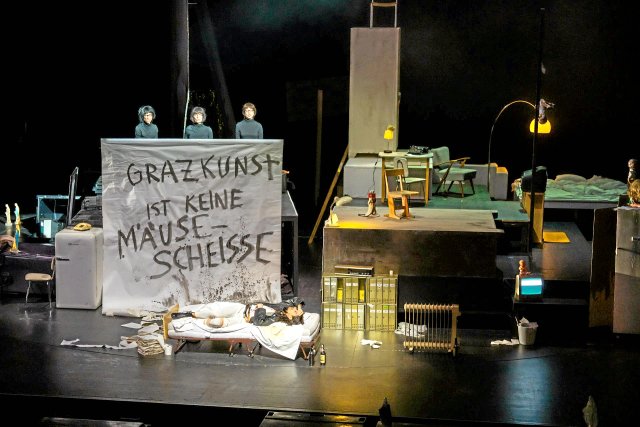Scene from “Schwabgasse 94”, a homage to Werner Schwab.
Photo: Schauspielhaus Graz/ Jo Ambrosch
Under the title “Schwabgasse 94,” director David Bösch brings a “homage to Werner Schwab” to the stage of the Graz Schauspielhaus. The collage with the “Greatest Hits” of the enfant terrible, who died young, reveals, 30 years after his death, what about his work is suitable for nostalgic projection for the surviving cultural scene of his hometown – and what, fortunately, is not.
The German feature section gave the distinctive style of these pieces – they were called, for example, “Volksvernichtung or My liver is senseless” or “Finally dead, finally no more air” – even during the author’s lifetime, in those few years of his sudden international success in the early 1990s. his own name: he didn’t write in German, but in “Swabian.” It is certainly wrong to derive the 2024 contemporary directing theater mainstream, which operates with text surfaces, exclusively from the success of this “Swabian”. But it is plausible that the theater makers’ initial interest in Schwab’s texts around 1990 was due not least to the special new freedoms that his language offered them.
nd.DieWoche – our weekly newsletter

With our weekly newsletter nd.DieWoche look at the most important topics of the week and read them Highlights our Saturday edition on Friday. Get your free subscription here.
When viewed superficially, “Swabian” appears to be an artistic caricature of everyday Austrian language. Firstly, it is characterized by a precise use of tenses, especially the pre-future; secondly, by transforming abstracts into concrete objects by adding indefinite articles; thirdly, through nominalizations that transform the world of the speakers into a claustrophobic hodgepodge of people standing around with no attention to themselves Things transform, abolish the difference between dead and living nature. In terms of content, this corresponds to the fact that in Schwab’s stage universe people are always things among others, of course mere means to an end for the stronger. This relationship between ruler and victim can turn over and over again, but will never be qualitatively transformed. The vain desire for such transformation is the energy reservoir of the bitter comedy that characterizes the plays.
Now such a life’s work is only partially suitable as a foil for self-staging of the cultural location of the respective hometown. If the content of the works is the undeniable brutality of the conditions in Austrian families, the anchoring of the numerous different types of abuse and exploitation in very specific, but always clear Austrian ideologies of hostility to the body, then it is absurd to celebrate these very circumstances for producing such a work of literary historical significance.
The “Homage to Schwab” at the Graz Theater balances on a fine line. Its underlying idea is to generate a greatest hits medley of scenes from the most famous plays using text material from Schwab’s notebooks, with the characters going beyond the limits of “their” Pieces interact with each other. This succeeds to the extent that the ensemble relies on the brutally comic characteristics of the work and avoids the empathic tragedy. The socially critical elements thus become the color of the historical genesis of their material.
Structurally, in “Schwabgasse” we see nested short versions of the plays “The Presidents” and “Volksvernichtung”. Particularly parts that really hurt (for example, when the “abnormal” Herrmann describes in detail to his mother how his guardian abused him) only work in the presented synopsis because of their humor. Because without this physically painful comedy, we would take the characters more seriously than the context in which they stand, and the repeated change from one of Schwab’s plays to the next would not function like the scene changes in a Punch and Judy show, as here.
In terms of acting, the presence of Annette Holzmann should be emphasized, whose character (the “Mariedl” from the “Presidents”) in this potpourri has the most contradictory functions written on the small toilet woman’s body – which Holzman never lets us feel. Mervan Ükmez copes remarkably well with the logical but thankless task of playing the aforementioned Herrmann at the same time as an avatar of the author; and Rudi Widerhofer as “Hundsmaulsepp” has the best comic timing of the evening.
The whole undertaking can just so only aimed at the Graz audience. Only here do most interested theatergoers recognize the most important pieces and some still have personal memories of this or that premiere. The impulse of this “homage to Schwab” itself remains ambivalent. But what makes it thoroughly enjoyable is the trust shown in the indestructibility of Schwab’s work for a theater that will (perhaps) be able to cope with the brutality of the real conditions even “thirty years later”.
Next performances: February 3rd, February 15th, February 28th, March 13th, March 27th
Subscribe to the “nd”

Being left is complicated.
We keep track!
With our digital promotional subscription you can read all issues of »nd« digitally (nd.App or nd.Epaper) for little money at home or on the go.
Subscribe now!
sbobet88 judi bola online judi bola judi bola online
